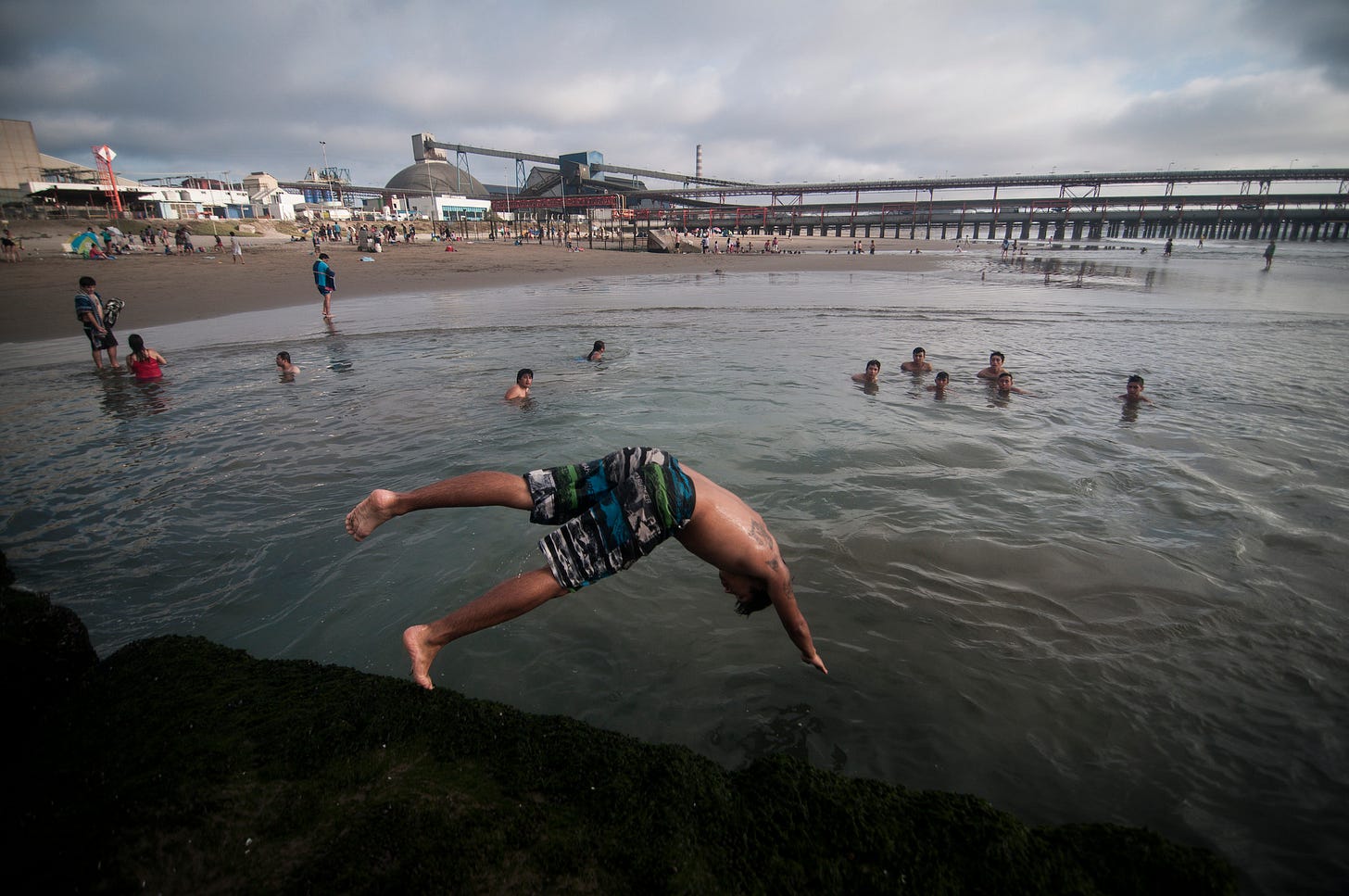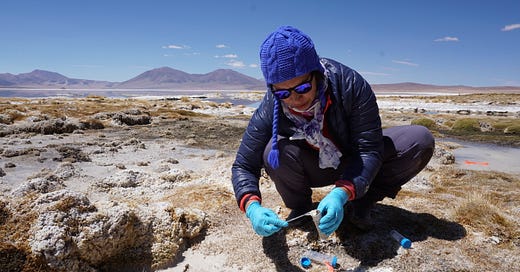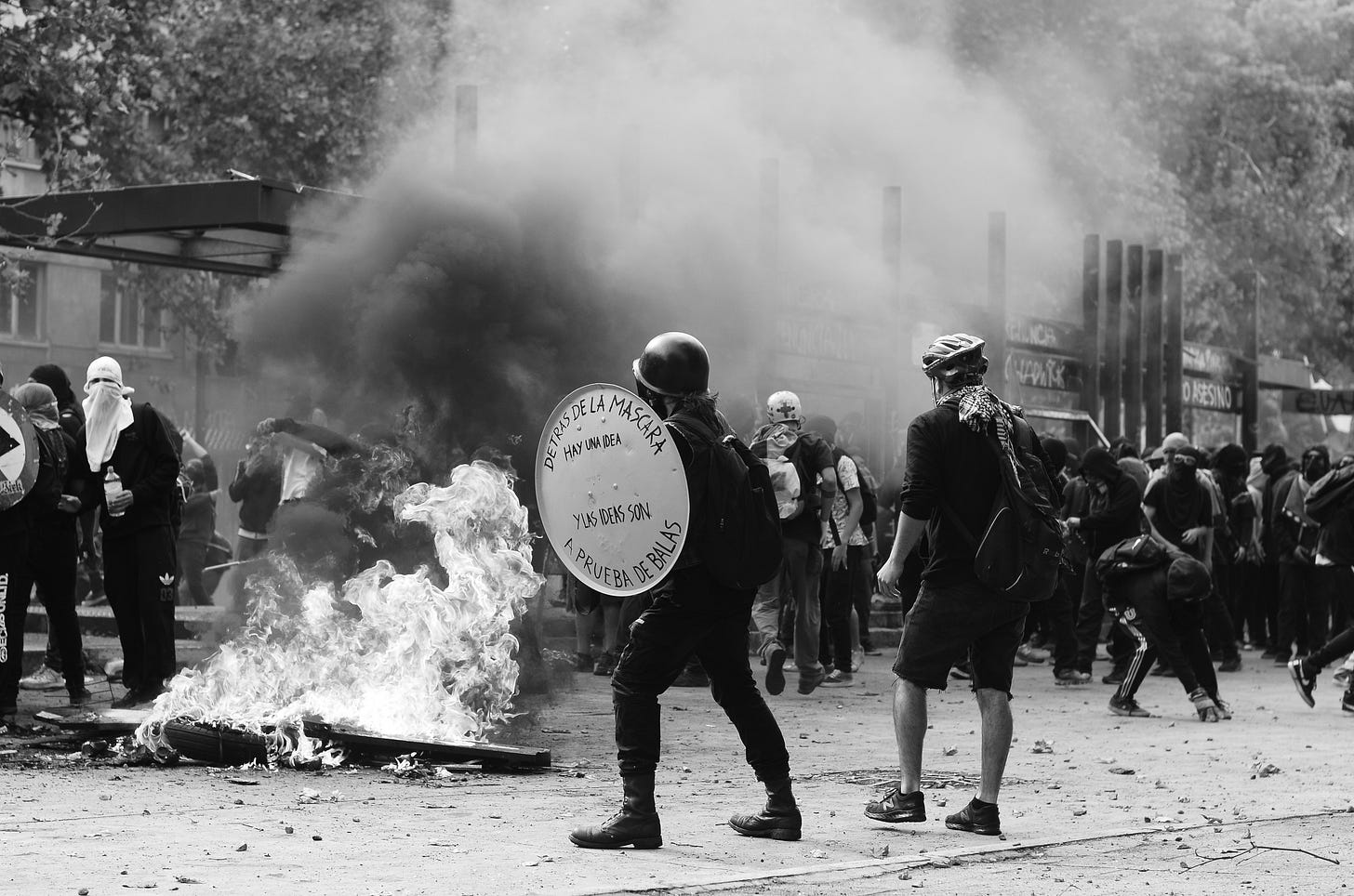#60 - Why the world should look at Chile’s new constituent assembly
By Francisco Parra in Santiago, Chile
Recently I have been asking myself exactly what happened in October 2019. The rage unleashed, the tear gas in the air, the eyes mutilated by the police, the territorial assemblies, the banging against saucepans. The open-air museum that the walls of Santiago de Chile turned into: new constitution or nothing. Our legacy will be to erase your legacy. Until dignity becomes customary.
I have experienced many social mobilisations in my life. I was 14 years old when I first took to the streets to protest against Chile’s unequal teaching system. As a journalist, I covered the fight for the recovery of water in Petorca, the massive marches against the privatised pension system providing payments below the poverty line, the feminist mobilisations of 2018.
Each one ended, in one way or another, clashing with Chile’s 1980 constitution, inherited from the Augusto Pinochet dictatorship: the constitutional court barring progressive changes; the text itself, the only in the world that guarantees private water rights and the need for a two-third majority in Congress to change anything in the constitution.
For 30 years, Chile was held up as an example of economic growth and democratic stability in a highly conflicted region. But inequalities and extractivism deepened in a model focussed on high economic profits and low environmental protection, as Chilean political scientist Pamela Poo says.
Now, we are about to begin a constituent assembly. For the first time in our history, it will not be elite white men writing the constitution. It will be teachers, women, indigenous people: the real Chile. In the midst of the climate crisis and a global pandemic, the country has the chance to restructure its social contract as human beings, how we conceive the territory, how we relate to nature.
The different faces of a constitution
The country of Chile has more than six thousand kilometers of coastline. It is a long, narrow strip of land.
Chile and its neighbours Argentina and Bolivia together hold 85% of the world's lithium reserves. A few weeks ago, days before being elected with the highest vote in the region as a constituent in the new assembly by the city of Antofagasta, I spoke with Cristina Dorador, a microbiologist and expert in the microbial life of the salt flats, about how the economic calculation is to exploit100% of these ecosystems. His position is clear: “I hope that we do not become a territory that destroys itself to satisfy the demands of the northern hemisphere. Climate change is not going to stop because they have electric cars.”
We are the most centralised country in Latin America, but we still have an enormous diversity of climates, territories, peoples and conflicts. A few years ago, after more than a thousand children suffered massive poisoning in Quintero and Puchuncaví, we became accustomed to talking about the “sacrifice zones”.
These sacrifice zones led the “yes” votes for a new constitution in the referendum last October. And it is perhaps the people of Tocopilla and Mejillones, where Chile’s coal-fired thermoelectric plants are concentrated and the chances of developing a malignant tumour are 2.7 times higher than in the rest of the country, who want a radical change more than anyone else. Or at least to have the option to decide what happens in their territory.

Petorca is another example. Avocado capital of Chile, it is also the origin of Modatima, an organisation for the defense of water that popularised the slogan that accompanied the country's mega-drought: "It's not drought, it's looting." A study established that 50% of the Petorca river drought can be attributed to mismanagement: overexploitation of the rights which give favour to private interests alongside outright theft of water. Modatima took a leap in the last elections. One of the organisation’s founders, Carolina Vilches, became a member of the constituent assembly and another, Rodrigo Mundaca, the new governor of Valparaíso. Both have received death threats. Chile has refused to sign the Escazú Agreement, which seeks to guarantee access to justice for environmental defenders in Latin America.
In the elections we had for the first time seats reserved for indigenous peoples in the constituent assembly. Francisca Linconao, a traditional Mapuche leader, received the most votes for the Mapuche's seat in the assembly. Linconao’s own history mirrors a 500 year long conflict that remains without resolution. In 2009, she won a lawsuit using the International Labour Organization’s 1989 Indigenous and Tribal Peoples Convention to protect a local native forest against the advance of the forestry industry. Then came the worst: the state accused her of terrorism for orchestrating a fire that ended in the death of two settlers in the area. She was jailed and went on hunger strike. She was later acquitted of all crimes.
The last elections were a debacle for the politics of the past 30 years. The right wing, which currently governs Chile with businessman Sebastián Piñera as our president, did not get the third it hoped for to block radical changes. The traditional center-left came in behind the left-wing coalition formed by the Frente Amplio (“Broad Front”) and the Communist Party.
Overall, 77 elected constituents out of 155 come from lists that say they will push for radical changes to the neoliberal system: 92% want to guarantee access, protection and distribution of water as a fundamental human right, 41% want to establish an national energy system which guarantees equal access to clean and pollution-free energy, and 70% are in favour of Chile officially becoming an plurinational state.
Academics Antoine Maillet and Francisco Martínez have identified 21 members as the “ecologist bench”. They are people who not only say they agree with the protection of the environment, but have histories marked by socio-environmental conflicts.
One proposal on the table considers reordering the country according to the 101 hydrographic basins in order to confront Chile’s water crisis. Another is to appoint an environmental ombudsman who would be in charge of enforcing the newly enshrined constitutional rights and help to avoid what happened in Ecuador and Bolivia, where the letter of the constitution has not been sufficient to protect the environment. A further proposal looks at how to reveal the ecosystem services provided by forests, glaciers, rivers and others in order to establish environmental limits to private property.
Since a group of students decided to jump the turnstiles and say "it's not about 30 pesos, it's about 30 years", major mobilisations have also taken place in Peru and Colombia.
Latin America, it seems, is taking new pathways.
Francisco Parra is a Chilean freelance environmental journalist. He worked as editor in chief in El Desconcierto and is co-founder of the environmental media outlet MediAmbiente. He also works for Climate Tracker. Follow him on Twitter at @frparrag.
This post was translated from Spanish by Jocelyn Timperley.
This post was funded by a climate investigation grant awarded to From A Climate Correspondent by the European Federation for Science Journalism (EFSJ) and funded by the BNP Paribas Foundation.
Must reads from the region
An interactive microsite showing the impacts of the climate crisis in Mexico and stories you can immerse yourself in. An example of good environmental journalism in the region.
Las mujeres que le ganaron al desierto - Isabela Ponce, GK
The incredible story of the struggle and resistance of four women - Blanca Atre, Adriana Tapia, Daisy Dota and Mélida Romero - from Ecuador. The article recently won the Ortega y Gasset award for best story.
Sin bosques no hay lluvias - Francisco de Zárate, Periodistas por el Planeta
The current times force us journalists to adapt and look for new narratives to tell about the climate crisis. This comic from Periodistas por el Planeta (Journalists for the Planet) to explain the fabulous flying rivers of the Amazon is an amazing example.
What else I’m reading
“The ecological collapse has already arrived: a compass to get out of evil (development)”
I am immersed in this recent book by Argentine authors Maristella Svampa and Enrique Viale. It is a guide for anyone who wants to jump right into the uncomfortable discussions about ecological collapse that we urgently need to have.
Who we are
From A Climate Correspondent is a weekly newsletter exploring the climate crisis from around the globe run by four journalists. We regularly feature guest writers.
Lou Del Bello is an energy and climate journalist based in Delhi, India.
Jocelyn Timperley is a climate journalist based in San José, Costa Rica.
Purple Romerois an climate change and human rights journalist based in Hong Kong.
Mat Hope is investigative journalist based in Nairobi, Kenya.




